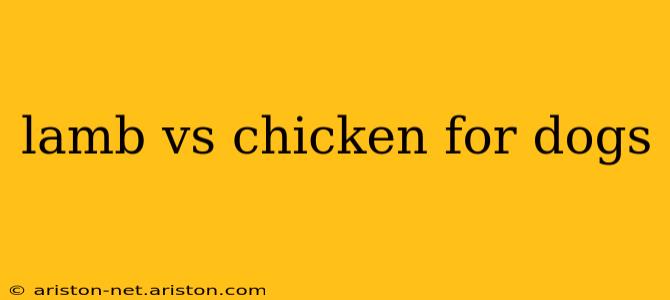Choosing the right protein source for your canine companion is crucial for their overall health and well-being. While both lamb and chicken are popular choices, understanding their nutritional differences can help you make an informed decision about what's best for your furry friend. This comprehensive guide dives deep into the nutritional profiles of lamb and chicken, addressing common concerns and helping you determine which protein might be the superior option for your dog.
What are the Nutritional Differences Between Lamb and Chicken?
Both lamb and chicken are excellent sources of protein, essential for building and repairing tissues, supporting a healthy immune system, and providing energy. However, they differ in their specific nutrient compositions.
Chicken: Generally considered a leaner protein source, chicken boasts a higher concentration of easily digestible proteins. It's also a good source of niacin, selenium, and vitamin B6. However, some dogs may have sensitivities to chicken, particularly those with allergies.
Lamb: Offers a richer flavor profile, often appealing to even the pickiest eaters. It's a great source of iron, zinc, and vitamin B12. Lamb is also known for its higher fat content compared to chicken, which can provide additional energy but may need to be considered for dogs prone to weight gain.
Is Lamb Better Than Chicken for Dogs with Allergies?
H2: My dog is allergic to chicken. Is lamb a good alternative?
Yes, often lamb is a suitable alternative for dogs with chicken allergies. Since lamb and chicken are quite different proteins, a dog allergic to chicken may tolerate lamb well. However, it's crucial to introduce any new protein gradually to monitor for any adverse reactions. Always consult your veterinarian before making significant dietary changes, especially if your dog has known allergies. It's also important to note that while lamb is often a good alternative, some dogs may exhibit sensitivities to other proteins, including lamb.
Which Protein is Easier to Digest for Senior Dogs?
H2: Which protein is easier to digest for older dogs?
Both chicken and lamb are generally well-digested by dogs, including senior dogs. However, chicken, due to its leaner nature and easily digestible protein structure, is often preferred for senior dogs or those with sensitive digestive systems. However, if your senior dog has no digestive issues, lamb can be a perfectly acceptable protein source, providing valuable nutrients.
How Do Lamb and Chicken Compare in Terms of Fat Content?
H2: Is lamb fattier than chicken?
Yes, lamb generally has a higher fat content than chicken. While this added fat can provide energy and support healthy skin and coat, it's crucial to consider your dog's individual needs and weight management. Overweight or obese dogs might benefit more from the leaner option of chicken.
Can I Feed My Dog Only Lamb or Only Chicken?
H3: Is a diet consisting solely of lamb or chicken healthy for my dog?
While both lamb and chicken are excellent protein sources, feeding your dog a diet consisting solely of one protein isn't ideal. A balanced diet should include a variety of nutrients, including carbohydrates, fats, and other essential vitamins and minerals. Commercial dog foods typically provide this balanced nutrition, while homemade diets require careful planning and supplementation to ensure your dog receives all necessary nutrients. Consult your veterinarian or a veterinary nutritionist to create a balanced, species-appropriate diet for your dog.
Conclusion: The Verdict on Lamb vs. Chicken
Ultimately, the "better" protein – lamb or chicken – depends entirely on your individual dog's needs and preferences. Chicken may be a better option for dogs with sensitive stomachs or allergies to lamb, while lamb can be a great alternative for dogs with chicken allergies or those who simply enjoy the taste. Always consult your veterinarian before making substantial changes to your dog's diet. They can help you choose the best protein source and formulate a balanced diet to support your dog's long-term health and happiness. Remember, a balanced diet, regular exercise, and veterinary care are crucial components of a healthy and happy life for your canine companion.
